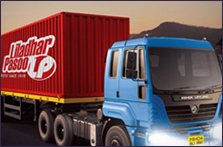— Rajesh Mehta, Executive Director, Liladhar Pasoo
 Granting industry status to logistics will mean focused regulation and control and encourage investment and bank funding to the sector, Rajesh Mehta tells Prashant C. Trikannad in an email interaction. The leading Mumbai-based logistics company has a global presence in about 170 countries and has executed many projects and general cargo movements on a door-to-door basis.
Granting industry status to logistics will mean focused regulation and control and encourage investment and bank funding to the sector, Rajesh Mehta tells Prashant C. Trikannad in an email interaction. The leading Mumbai-based logistics company has a global presence in about 170 countries and has executed many projects and general cargo movements on a door-to-door basis.
Now that we have a new government, what are your expectations for the infrastructure sector in general and the logistics sector in particular?
It is appreciative to see immediate action taken by the new government and even more to see their commitment to development of infrastructure.
India’s infrastructure is not at all equipped to handle the pressure of expected growth of 7 to 8 per cent over the next decade. As of today two-third of India’s infrastructure is yet to be built. Government’s serious initiative will definitely help the logistics industry to bring more efficiency in terms of time and cost.
We wish to have infrastructure designed to connect ports and markets to industrial zones as it will facilitate smooth and safe movement of regular and ODD dimension cargo and at reasonable time and cost.
Would you be happy with the merger of the ministries of roads and highways and shipping? Would you also like to see railways included in a consolidated ministry of transport?
Road, rail, air and shipping are specialised modes of transportation and have their own perspective and nuances. I feel that merging will not help as it will never generate an integrated pragmatic policy where all three modes of transport can wor k seamlessly.
k seamlessly.
Rather, I am of the opinion that a multimodal transport ministry be formed, where experts from road, rail, air, and shipping and trade should come together to formulate an integrated policy and procedure with a single focus of serving the trade on documentation, permission, safety, operations, time and cost.
What key reforms and policies are you hoping for in the logistics sector?
Logistics is still not issued an industry status and until then it will have to work under different policies, procedures and regulations.
“Logistics is spine of industry and it can cripple any growth if not efficient.” Granting industry status means focused regulation and control. It will also encourage investments and bank funding. Any development happening should consider the needs of trade over next decade and then implement the projects. It must have a vision to increase efficiency and bring down cost.
A single ministry which looks over multimodal transport issues and decides on the growth plan is urgently needed.
Thus, I anticipate an integrated multimodal transport policy wherein trade is insured for its compliances and safe receipt or delivery of goods and service providers/stakeholders on its efficiency.
Logistics experts have also suggested a separate regulatory authority for the sector on the lines of IRDA or TRAI.
Today, to execute a single logistics transaction, customer has to keep in mind and comply at least two regulations and in certain cases four. This means that a small disconnect and customer ends up losing his claim on cargo as every law will be investigating the case as per its perspective and eventually pushing the issue into litigation; hence, regulations which can direct and address MTO-related issues are welcome.
How can the new government revitalise the logistics sector which is beleaguered by operational inefficiency and high cost?
India’s loss due to logistics inefficiency is around $45 billion which is equivalent to 4.3 per cent of today’s GDP and if this is not tackled now, it will rise to $140 billion by 2020. What we require is an Integrated Logistics Policy which will look over development of road, rail, air and waterways to connect high growth areas as it will considerably pull down India’s logistics cost from current 13 per cent of GDP.
Focus on quality of roads, efficient rail, exploring waterways, improving connectivity between ports and industrial zones, shortage of skill and adaption of latest technology will be good enablers to revitalise the logistics sector.
What are some of the major challenges and bottlenecks in the sector today?
The major bottlenecks are poor infrastructure, lack of integrated regulations, speed at which the development is happening and discreet decision, which lack vision, to take on the ever-increasing pressure on infrastructure, once trade bounces back.
How will the implementation of GST benefit logistics companies?
GST will encourage seamless interstate movement and also help control goods distribution all over India through a few nodal points warehouse. It will help reduce damages and multiple handling of goods. This in turn will reduce the logistics cost making way for more volumes.
Can you briefly talk about the current growth and operations of Liladhar Pasoo?
Liladhar Pasoo is well focused to develop a single window logistics solution globally. We have been successfully rendering customised international logistics solutions for almost 20 different industries. This is due to our own controlled offices, operational skillset, global network in 170 countries and 19 offices locally backed by cutting edge technology. We are looking forward to achieving sales of Rs. 1,000 crore by 2017.
Being an asset-based company, we have all the flexibility to offer customised solutions and innovate.
What are your company’s plans for the current year and for the remainder of the 12th Plan?
We are planning to increase our warehouse strength from current 7 lakh sq. ft to 10 lakh sq. ft all over India. We have plans to open our own offices in USA, UK, Europe, Middle East, Singapore and China to develop trade lanes and offer one-stop logistics solutions across boundaries, whereby we can control the cargo at both ends and offer more value added services to customers.











